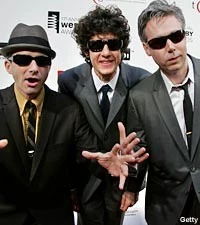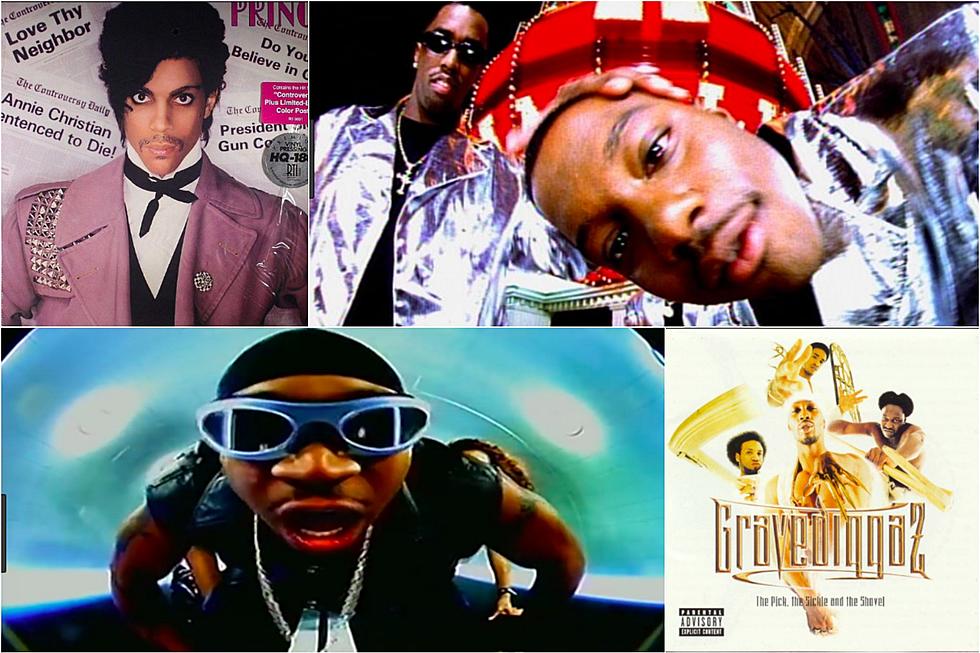
Color-Coded in Hip-Hop
 February is more than just Black History Month -- it's a time of remembrance and a period to reflect on just how far the struggle for equality has come since the darkest days of America's Civil Rights Movement. And while the commercialization and digitization of music has caused hip-hop to lose some of its bite in recent years, it's easy to overlook just how much of an impact it has had on uniting listeners of all ethnicities and colors.
February is more than just Black History Month -- it's a time of remembrance and a period to reflect on just how far the struggle for equality has come since the darkest days of America's Civil Rights Movement. And while the commercialization and digitization of music has caused hip-hop to lose some of its bite in recent years, it's easy to overlook just how much of an impact it has had on uniting listeners of all ethnicities and colors.
From its earliest days, hip-hop was created in the black community, evolving from feel-good party music into a method of expression to reflect on its place in American society and voice the injustices that had befallen African-Americans in the post-disco era. But as hip-hop and rap became a movement and began to tiptoe across the mainstream divide, a few good men helped plant the seeds to give way to a culture that was both accepting and inclusive of all colors.
Def Jam Introduces the Beastie Boys

Often credited as the first mainstream rap label, Def Jam Recordings was one of the first hip-hop institutions to open the umbrella wide enough to shelter more than one race. As much as hip-hop may still be considered a predominately black culture, the label was hatched in 1984 on a colorblind foundation when a grungy Rick Rubin teamed up with a young Russell Simmons and founded the imprint out of Rubin's NYU dorm room. The pairing forever proved that the love of hip-hop wasn't just meant for one group of people over another -- it stretched across racial barriers.
And what further distinguished Def Jam was that it didn't see hip-hop as dependent on skin color or as a certain stereotype for mainstream rappers. While some of its flagship artists like LL Cool J and Run-DMC set the bar for the generations of rappers to come, it also opened up audiences to rappers who didn't quite look like typical emcee: Beastie Boys, consisting of Michael "Mike D" Diamond, Adam "MCA" Yauch and Adam "Ad-Rock" Horovitz.
As one of the first albums to get released by the label, Beastie Boys' 'Licensed to Ill' did something with the genre that hadn't yet been done: The trio of trash-talking former punk rockers proved they were just as dexterous on the mic as their labelmates, working influences like hard rock and metal into their tunes as they helped bridge the gap between racially polemic styles of music. The group boldly proved that creating hip-hop wasn't just relegated to a certain type of person -- it could truly fit any mold.
Also, based on the success of the Beasties' debut album, audiences didn't see hip-hop as color-coded, either. Upon release in November 1986, the album became the first rap release to top the Billboard 200 chart, a feat that proved that the love of hip-hop did not just include listeners of all races but of creeds, ages and both genders, as well. Witty lyricism, musical inventiveness and unique swagger transcended all cultural limitations and inevitably pushed for hip-hop to gain more of a presence in both the general media and mainstream culture. 'Licensed to Ill' went on to sell more than 9 million copies. The door wasn't just open to black and white lyricists and audiences – it reached across to other ethnicities, too.
 Though Latinos have been a part of hip-hop from its inception, rappers like Big Punisher and Fat Joe and groups such as the Beatnuts expanded the boundaries of what the mainstream culture would accept when it came to capability of getting busy on the mic. Though Big Pun came later in the game than the Beatnuts, he became the first lyricist to pave a separate road for Latino rappers on the highway to commercial success. With his 1998 debut album, 'Capital Punishment,' the larger-than-life emcee broke ground as the first solo Latino rapper to go platinum, once again proving to a mainstream audience that background and physical appearance meant nothing if the skills were in order. And long after Pun passed in 2000, hip-hop heads and laypeople alike would appreciate Pun for his contributions to the culture, with Pun consistently mentioned as one of the best emcees -- cultural background aside -- to have ever graced the mic.
Though Latinos have been a part of hip-hop from its inception, rappers like Big Punisher and Fat Joe and groups such as the Beatnuts expanded the boundaries of what the mainstream culture would accept when it came to capability of getting busy on the mic. Though Big Pun came later in the game than the Beatnuts, he became the first lyricist to pave a separate road for Latino rappers on the highway to commercial success. With his 1998 debut album, 'Capital Punishment,' the larger-than-life emcee broke ground as the first solo Latino rapper to go platinum, once again proving to a mainstream audience that background and physical appearance meant nothing if the skills were in order. And long after Pun passed in 2000, hip-hop heads and laypeople alike would appreciate Pun for his contributions to the culture, with Pun consistently mentioned as one of the best emcees -- cultural background aside -- to have ever graced the mic.
And that's the beauty of hip-hop culture in the digital era. Emcees like Eminem, Pitbull and Asher Roth are continually mentioned in the same breath as Jay-Z, Nas and Snoop Dogg, and collaborations between emcees of all colors, religions and backgrounds come to light on a regular basis. While it would be naive to think that hip-hop has completely erased all discrepancies between races in a world where hate crimes and racism continue to make headlines, hip-hop has in some way contributed to making this a better world in which to live.
Whereas history is pockmarked with scars of injustice and intolerance that lacked any solid rational foundation, hip-hop and rap have helped to heal those wounds. The culture and its messages have united both the people that produce the music and bring it to a wider audience with those who listen to the music and enjoy it for its aesthetic worth. Black History Month isn't just about celebrating black history for how far African-Americans have come in America – it's about acknowledging how a product of black culture has been accepted as a part of mainstream American society without compromising its core values. And that alone is worth at least a month-long celebration.
More From TheBoombox









